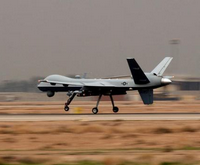A few days after the discovery of an al-Qaida plot to ship bombs disguised as printer cartridges from Yemen to the United States, a powerful explosion shook the ground in Gaza City. The blast ripped apart a brand new car, just imported into Gaza, as it drove near police headquarters in the coastal strip's largest city. After some initial confusion about what had happened, Israeli officials took responsibility for the blast, saying its security forces had killed a top terrorist on the verge of carrying out a massive operation. Most of the Israeli and international media accepted that version of events. But details that emerged from subsequent reports opened up another possibility: that Washington had played a role in the hit, or even carried it out.
The Nov. 3 killing of Mohammed Jamal al-Nenmen raises two important questions. First, what role, if any, did America have in the assassination? Second, if Washington was involved in the operation, why did the U.S. deny it? After all, the Pentagon has been targeting members of violent extremist organizations for years now. American Predator drones cruise the skies above Afghanistan, Pakistan, Yemen, Somalia, and perhaps other places, launching missile strikes to kill people that Washington has determined are dangerous enemies -- and the U.S. makes no apologies about it.
Nemnem -- whose name is variously transliterated from Arabic as Namnam, Nemnem and Nimnim -- was an important member of the Army of Islam, a Gaza-based group with loose links to al-Qaida and a track record of attacks against Israelis. In addition to his role as field commander, Nemnem acted as head of security for Mumtaz Durmush, who leads the Army of Islam as well as the powerful Gaza clan that bears his name. The Durmush became known internationally after kidnapping BBC reporter Alan Johnston and holding him hostage. Israel believes they also participated in the abduction of Gilad Shalit, the Israeli soldier held captive since 2006. The Durmush clan's position in Gaza has fluctuated from bitter rivalry and even violent confrontation with Hamas, to a loose partnership and accommodation with the organization.

